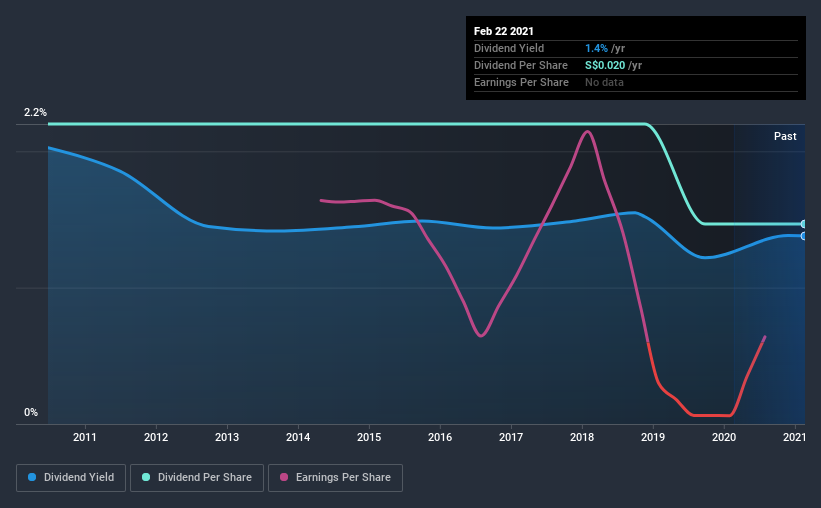- Singapore
- /
- Food and Staples Retail
- /
- SGX:K03
Do Investors Have Good Reason To Be Wary Of Khong Guan Limited's (SGX:K03) 1.4% Dividend Yield?
Dividend paying stocks like Khong Guan Limited (SGX:K03) tend to be popular with investors, and for good reason - some research suggests a significant amount of all stock market returns come from reinvested dividends. Yet sometimes, investors buy a popular dividend stock because of its yield, and then lose money if the company's dividend doesn't live up to expectations.
While Khong Guan's 1.4% dividend yield is not the highest, we think its lengthy payment history is quite interesting. Before you buy any stock for its dividend however, you should always remember Warren Buffett's two rules: 1) Don't lose money, and 2) Remember rule #1. We'll run through some checks below to help with this.
Click the interactive chart for our full dividend analysis

Payout ratios
Dividends are usually paid out of company earnings. If a company is paying more than it earns, then the dividend might become unsustainable - hardly an ideal situation. Comparing dividend payments to a company's net profit after tax is a simple way of reality-checking whether a dividend is sustainable. In the last year, Khong Guan paid out 1,025% of its profit as dividends. A payout ratio above 100% is definitely an item of concern, unless there are some other circumstances that would justify it.
Another important check we do is to see if the free cash flow generated is sufficient to pay the dividend. Unfortunately, while Khong Guan pays a dividend, it also reported negative free cash flow last year. While there may be a good reason for this, it's not ideal from a dividend perspective.
With a strong net cash balance, Khong Guan investors may not have much to worry about in the near term from a dividend perspective.
Remember, you can always get a snapshot of Khong Guan's latest financial position, by checking our visualisation of its financial health.
Dividend Volatility
One of the major risks of relying on dividend income, is the potential for a company to struggle financially and cut its dividend. Not only is your income cut, but the value of your investment declines as well - nasty. Khong Guan has been paying dividends for a long time, but for the purpose of this analysis, we only examine the past 10 years of payments. Its dividend payments have declined on at least one occasion over the past 10 years. During the past 10-year period, the first annual payment was S$0.03 in 2011, compared to S$0.02 last year. This works out to be a decline of approximately 4.0% per year over that time. Khong Guan's dividend hasn't shrunk linearly at 4.0% per annum, but the CAGR is a useful estimate of the historical rate of change.
We struggle to make a case for buying Khong Guan for its dividend, given that payments have shrunk over the past 10 years.
Dividend Growth Potential
With a relatively unstable dividend, it's even more important to see if earnings per share (EPS) are growing. Why take the risk of a dividend getting cut, unless there's a good chance of bigger dividends in future? Over the past five years, it looks as though Khong Guan's EPS have declined at around 47% a year. With this kind of significant decline, we always wonder what has changed in the business. Dividends are about stability, and Khong Guan's earnings per share, which support the dividend, have been anything but stable.
Conclusion
Dividend investors should always want to know if a) a company's dividends are affordable, b) if there is a track record of consistent payments, and c) if the dividend is capable of growing. It's a concern to see that the company paid out such a high percentage of its earnings and cashflow as dividends. Earnings per share are down, and Khong Guan's dividend has been cut at least once in the past, which is disappointing. Using these criteria, Khong Guan looks quite suboptimal from a dividend investment perspective.
Companies possessing a stable dividend policy will likely enjoy greater investor interest than those suffering from a more inconsistent approach. At the same time, there are other factors our readers should be conscious of before pouring capital into a stock. Just as an example, we've come accross 3 warning signs for Khong Guan you should be aware of, and 1 of them is a bit concerning.
If you are a dividend investor, you might also want to look at our curated list of dividend stocks yielding above 3%.
When trading Khong Guan or any other investment, use the platform considered by many to be the Professional's Gateway to the Worlds Market, Interactive Brokers. You get the lowest-cost* trading on stocks, options, futures, forex, bonds and funds worldwide from a single integrated account. Promoted
Valuation is complex, but we're here to simplify it.
Discover if Khong Guan might be undervalued or overvalued with our detailed analysis, featuring fair value estimates, potential risks, dividends, insider trades, and its financial condition.
Access Free AnalysisThis article by Simply Wall St is general in nature. It does not constitute a recommendation to buy or sell any stock, and does not take account of your objectives, or your financial situation. We aim to bring you long-term focused analysis driven by fundamental data. Note that our analysis may not factor in the latest price-sensitive company announcements or qualitative material. Simply Wall St has no position in any stocks mentioned.
*Interactive Brokers Rated Lowest Cost Broker by StockBrokers.com Annual Online Review 2020
Have feedback on this article? Concerned about the content? Get in touch with us directly. Alternatively, email editorial-team (at) simplywallst.com.
About SGX:K03
Khong Guan
An investment holding company, engages in trading of wheat flour and other edible products in Singapore and Malaysia.
Flawless balance sheet with low risk.
Market Insights
Community Narratives



